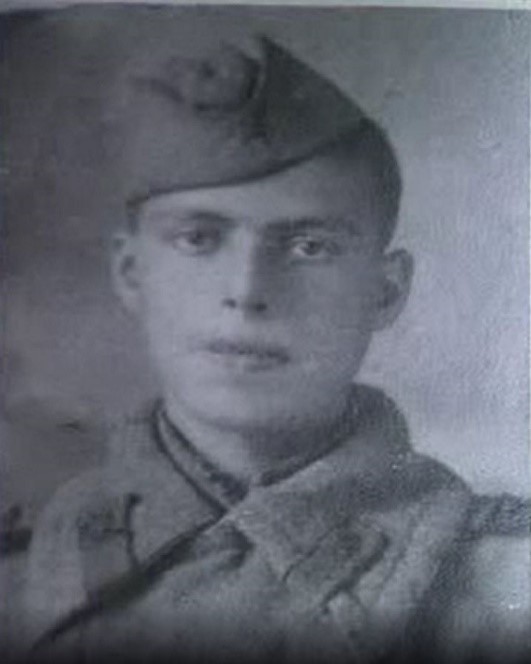Grigorii Druian was born in 1926 in Kharkiv, northeastern Ukraine. His father Iosif worked at the Kharkiv Electro-Mechanical Plant; he had been drafted during World War I and spent several years in German captivity. Grigorii's mother Rakhil was a homemaker. The family was moderately religious. By the time of the outbreak of the Soviet-German War in June 1941, Grigorii had completed a seven-year Ukrainian school. Following the outbreak of war, the Druian family failed to evacuate. Kharkiv was occupied by German troops in late October 1941. In December that year, Grigorii, his parents, and his younger brother found themselves incarcerated in the Kharkiv Ghetto. In January 1942, when the Red Army came relatively close to the city, Grigorii escaped from the ghetto and moved eastward to Kupyansk, where he hoped to run into Soviet troops. While crossing the front lines near Kupyansk, he was detained in the no-man's land by German soldiers, who sent him back into German-occupied territory. Druian spent the following year at various German camps, mostly at the Poltava camp. Throughout this period, he passed himself off as "Grigorii Vasilenko, a Ukrainian" (he was fluent in Ukrainian). In February 1943, during a Soviet air raid on the Poltava camp, many inmates, with Grigorii among them, escaped. Druian managed to cross the front line relatively quickly, and he eventually arrived in Novoshakhtinsk, a town in southern Russia, on the Ukrainian border. Here, the Soviets detained him for screening at a "filtration camp". He was incarcerated there for three months. In May 1943, Druian was cleared of all suspicions, released, and drafted into the Red Army. Being underage, Druian was not assigned to frontline duty. Instead, he was sent to the recently liberated Stalingrad area, where his unit was charged with removing the dead bodies from the city and the surrounding area, and with maintaining order. In October 1943, Druian underwent further military training, and was then attached to the Karelian Front in northern Russia. He took part in the crossing of the Svir (Syväri) River and in the Red Army offensive in Soviet Karelia. In October 1944, he participated in the Petsamo–Kirkenes Offensive of the Red Army, after which he was sent away from the front line, to attend a radiolocation course in Gorky (present-day Nizhny Novgorod). Druian met V-E Day as a cadet in Gorky. He went on to serve in the Red Army until 1948. Druian's parents and younger brother perished in the Kharkiv Ghetto. His elder brother Zalman was drafted into the Red Army in 1939 and served there until 1945. His sister Golda graduated from a medical college, and was drafted into the Red Army as a medical orderly in 1941; she survived the war. After being discharged from the military, Grigorii Druian settled in Daugavpils, Latvia.
Sunday to Thursday: 09:00-17:00
Fridays and Holiday eves: 09:00-14:00
Yad Vashem is closed on Saturdays and all Jewish Holidays.
Entrance to the Holocaust History Museum is not permitted for children under the age of 10. Babies in strollers or carriers will not be permitted to enter.







